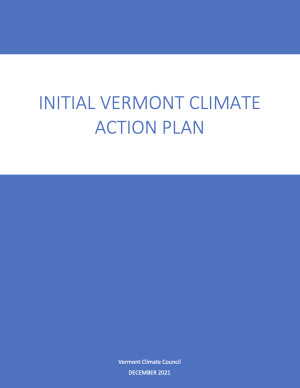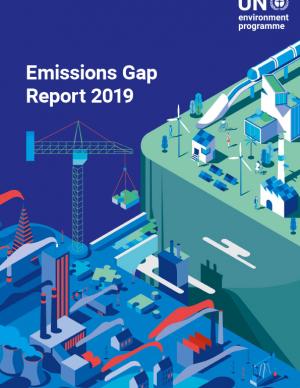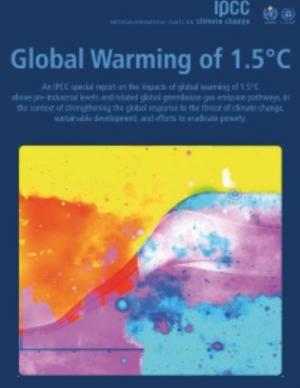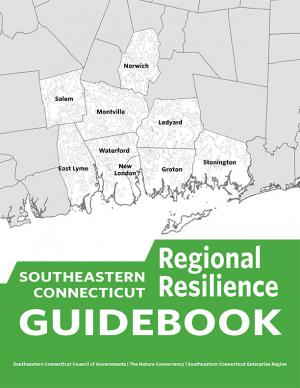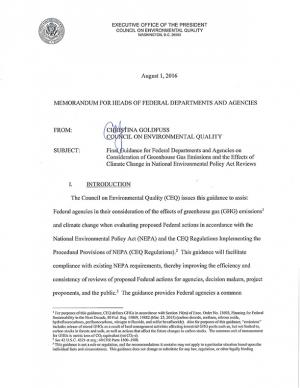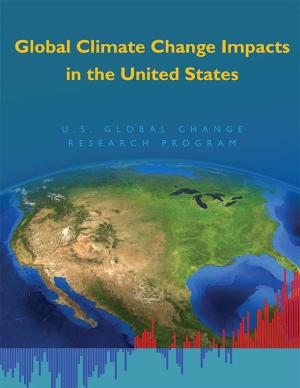Access a range of climate-related reports issued by government agencies and scientific organizations. Browse the reports listed below, or filter by scope, content, or focus in the boxes above. To expand your results, click the Clear Filters link.
The Vermont Climate Action Plan aims to dramatically reduce greenhouse gas emissions, help protect Vermont communities and landscapes from the greatest risks of climate change, and create new clean energy industry and jobs. The Climate Action Plan includes strategies to:
- Reduce greenhouse gas emissions from the transportation, building, regulated utility, industrial, commercial, and agricultural sectors;
- Encourage smart growth and related strategies;
- Achieve long-term sequestration and storage of carbon and promote best management practices to achieve climate mitigation, adaption, and resilience on natural working lands;
- Achieve net zero emissions by 2050 across all sectors;
- Reduce energy burdens for rural and marginalized communities;
- Limit the use of chemicals, substances, or products that contribute to climate change; and
- Build and encourage climate adaptation and resilience of Vermont communities and natural systems.
The Climate Action Plan serves as a guide for the Vermont Legislature in setting policy that supports climate change solutions for Vermonters and Vermont's landscape.
A range of resources documenting report preparation are available in the Climate Action Plan Appendices.
As the world strives to cut greenhouse gas emissions and limit climate change, it is crucial to track progress towards globally agreed climate goals. For a decade, the Emissions Gap Report has compared where greenhouse gas emissions are heading against where they need to be, and highlighted the best ways to close the gap. This report presents the latest data on the expected gap in 2030 for the 1.5°C and 2°C temperature targets of the Paris Agreement. It considers different scenarios, from no new climate policies since 2005 to full implementation of all national commitments under the Paris Agreement. For the first time, it looks at how large annual cuts would need to be from 2020 to 2030 to stay on track to meeting the Paris goals. The report looks at the potential of the energy transition—particularly in the power, transport, and buildings sectors—and efficiency in the use of materials such as iron steel and cement.
This special report from the Intergovernmental Panel on Climate change describes the impacts of global warming of 1.5 °C above pre-industrial levels. The report also describes potential global greenhouse gas emission pathways, in the context of strengthening the global response to the threat of climate change, sustainable development, and efforts to eradicate poverty.
This guidebook results from the culmination of a year of dialogue among diverse stakeholders in southeastern Connecticut who defined challenges and solutions from extreme weather, climate change, and shifting social and economic conditions. Participants included representatives from nine municipalities, public and private utilities, public health departments, chambers of commerce, major employers, conservation organizations, academic institutions, community non-profits, and state agencies, among others. The dialogue captured six themed planning sectors (water, food, ecosystem services, transportation, energy, and regional economy) in a process that used surface and integrated solutions to address singular and multiple challenges across planning sectors. The guidebook provides a quick reference resource to help shape and inform actions that will advance a regional resilience framework for southeastern Connecticut; an accompanying Summary of Findings captures the project's final outcomes and conclusions, as well as providing a comprehensive account of the objectives, process, and details.
This document provides final guidance for federal agencies on how to consider the impacts of their actions on global climate change in their National Environmental Policy Act (NEPA) reviews, providing a framework for agencies to consider both the effects of a proposed action on climate change, as indicated by its estimated greenhouse gas emissions, and the effects of climate change on a proposed action. The memorandum applies to all types of proposed federal agency actions that are subject to NEPA analysis and guides agencies on how to address the greenhouse gas emissions from federal actions and the effects of climate change on their proposed actions within the existing NEPA regulatory framework.
Successfully negotiating climate change challenges will require integrating a sound scientific basis for climate preparedness into local planning, resource management, infrastructure, and public health, as well as introducing new strategies to reduce greenhouse gas emissions or increase carbon sequestration into nearly every sector of California’s economy. This Research Plan presents a strategy for developing the requisite knowledge through a targeted body of policy-relevant, California-specific research over three to five years (from early 2014), and determines California’s most critical climate-related research gaps.
The National Climate Assessment assesses the science of climate change and its impacts across the United States, now and throughout this century. It documents climate change-related impacts and responses for various sectors and regions, with the goal of better informing public and private decision making at all levels.
The assessment draws from a large body of scientific peer-reviewed research, technical input reports, and other publicly available sources; all sources meet the standards of the Information Quality Act. The report was extensively reviewed by the public and experts, including a panel of the National Academy of Sciences, the 13 federal agencies of the U.S. Global Change Research Program, and the Federal Committee on Environment, Natural Resources, and Sustainability.
This report, the first of its kind for the City of Grand Rapids, outlines the condition of the city's climate resiliency and offers recommendations for how it can both impact and adapt to climate change. The report's goal is to both spur a larger community conversation around processes that will enable Grand Rapids to become a more climate-resilient city and to spur many specific short- and near-term projects, policies, programs, and plans to mitigate the effects of climate change. The report documents projected local climate changes, their potential negative impact to low-income families, and outlines small near-term solutions that the city can make to curb or adapt to climate change. Recommendations include investing in green space and improving the city's tree canopy, improving the city's energy autonomy, and implementing green street infrastructure materials and maintenance techniques.
President Obama's Climate Action Plan includes a series of executive actions to reduce carbon pollution, prepare the United States for the impacts of climate change, and lead international efforts to address global climate change.
This report is the Second National Climate Assessment, summarizing the science and impacts of climate change on the United States. The report discusses climate-related impacts for various societal and environmental sectors and regions across the nation. It is an authoritative scientific report written in plain language, with the goal of better informing public and private decision making at all levels.
This Executive Order requires that King County, Washington, municipal departments employ coordinated strategies of land use to mitigate and adapt to global warming.

